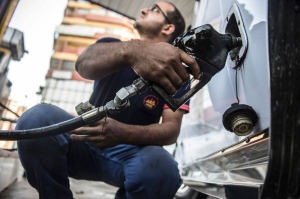Egypt inflation rises for first time in months on fuel hike


An Egyptian petrol station worker fills up a vehicle’s tank in the capital Cairo. Egypt’s inflation quickened after a reduction in fuel subsidies, disrupting a five-month streak of deceleration that was paving the way for the first interest-rate cut since 2020.
Annual consumer prices in urban parts of the North African country rose 26.2% in August compared with 25.7% in July, state statistics agency CAPMAS said Tuesday. The index increased 2.1% month-on-month, compared with 0.4% in July and the highest figure since February.
Food and beverage prices, the largest single component of the inflation basket, rose an annual 29%, versus 29.7% in July.
Egyptian inflation had been defying expectations by slowing even after authorities let the pound plunge nearly 40% in March to stem a two-year economic and foreign-exchange crisis. The move — which included an interest-rate hike — helped seal a global bailout of about $57bn led by the International Monetary Fund and United Arab Emirates.
A new wave of subsidy cuts has upset that inflationary trajectory, at least temporarily.
August’s acceleration came after price hikes of as much as 15% for a wide range of fuel products and the raising of some electricity tariffs. The steps followed a 300% increase in subsidized bread costs in June that didn’t affect the consumer-price index.
“I don’t think the numbers reflect any major changes to the inflation trajectory, but rather a bump on the road of disinflation,” said Mohamed Abu Basha, head of research at Cairo-based investment bank EFG Hermes. The main reason for the “negative surprise” was the larger-than-expected impact of the increase in fuel prices and the follow-through effect on transportation costs.
The new data increases the likelihood of Egypt’s central bank keeping interest rates at an all-time high of 27.25% for a fourth consecutive meeting when it next meets on October 17. Most economists expect the country to embark on a monetary-easing cycle toward the end of this year or in early 2025.
The Central Bank of Egypt should be able to cut in the first quarter of 2025, by when inflation “should materially slow down,” said Abu Basha.







